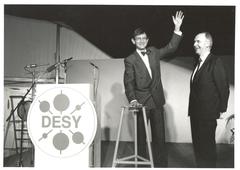URL: https://www.desy.de/news/news_search/index_eng.html
Breadcrumb Navigation
DESY News: Volker Soergel 1931 - 2022
News
News from the DESY research centre
Volker Soergel 1931 - 2022
DESY mourns the death of Prof. Dr. Dres. .h.c. Volker Soergel, long-time Chairman of the DESY Directorate and pioneer of the united DESY with locations in Hamburg and Zeuthen. Soergel passed away on 5 October at the age of 91. "Volker Soergel was one of the great visionaries of our research centre. An achievement that will always be associated with his name the Zeuthen Institute becoming part of DESY, a key success story of German unification,“ says Helmut Dosch, Chairman of the DESY Directorate. "Our thoughts are with his family."
His connection to the research centre began in the 1970s when, as a physics professor at the University of Heidelberg, he was elected chairman of the Scientific Council. From 1979 to 1980, he took over the role as Research Director at CERN, the European Organization for Nuclear Research in Geneva, and returned to Hamburg in 1981 as Chairman of the DESY Directorate.

Heinz Riesenhuber, then-science minister, and Volker Soergel pressing the HERA start button in 1990. Image: DESY
"It is thanks to Volker Soergel's courage, persuasiveness and leadership at DESY that HERA was able to find the backing of the scientific community worldwide and the political support to realise this major scientific project in Germany," says Beate Heinemann, Director of Particle Physics at DESY. “HERA's results on the structure of the proton are still invaluable today for evaluating data from the Large Hadron Collider LHC at CERN."

Volker Soergel at the 20th-anniversary celebrations at DESY in Zeuthen in 2012. Image: DESY
When Germany was reunited in 1990, the science and research landscapes in the East and the West reorganised themselves. Volker Soergel ensured the continued existence of the Institute for High Energy Physics IfH as one of the first institutes in the GDR after reunification and merged it with DESY. This is considered as one of the great success stories of German reunification.
Volker Soergel also fostered DESY's competencies in other research areas. Early on, during his time as Chairman of the Scientific Council, he worked on plans to further scientifically exploit the potential of synchrotron radiation at the DORIS accelerator. Under his guidance, photon science became an important pillar of DESY research, first as a "by-product" of the accelerators used for particle physics, then, with the inauguration of HASYLAB in 1981 and the conversion of DORIS, as an established research field in its own right.
After his time as DESY Director, he joined the Max Planck Institute for Physics in Munich for four years as Executive Director.
In 1993, Volker Soergel was awarded the Order of Merit of the Federal Republic of Germany, First Class, for his services to the expansion of DESY and, above all, to the establishment of international scientific cooperation. Among many other honours and awards, he also holds honorary doctorates from the Universities of Glasgow (1994) and Hamburg (2009).
With his death, DESY loses one of its most influential figures. With his foresight and leadership, he played a decisive role in shaping DESY. The research centre is deeply indebted to him.



